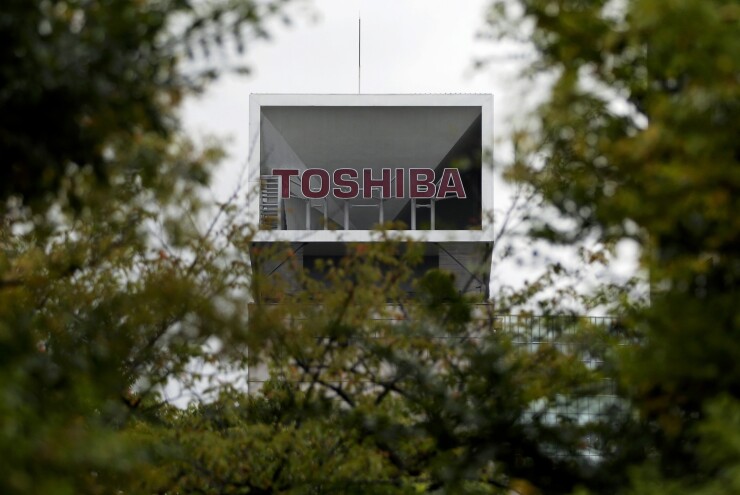Toshiba Corp., the 142-year-old conglomerate, warned on Tuesday it may not be able to continue as a going concern as it grapples with billions of dollars in losses from its Westinghouse Electric nuclear business.
Toshiba has been at odds with its auditors, PricewaterhouseCoopers Arata, over Westinghouse, which filed for bankruptcy in the U.S. last month. The auditing firm submitted an independent review with Toshiba’s results that emphasized the risks to its future because of losses in the Westinghouse unit responsible for atomic projects and breach of covenants on 284 billion yen in loans. Toshiba’s inability to report earnings has also raised speculation of a possible delisting from the Tokyo Stock Exchange.
The disclosure came as the Japanese company reported earnings for the third quarter after missing two previous deadlines for financial results. Toshiba posted an operating loss of 576.3 billion yen ($5.2 billion) for the nine months ended Dec. 31 and said it had negative shareholders equity of 225.6 billion yen, but, significantly, it wasn’t able to get PwC Aarata to approve those figures.
“Toshiba has done everything in its power to gain the understanding of the auditors,” chief executive officer Satoshi Tsunakawa said at a briefing with about 200 reporters in Tokyo. “Without clear prospects for auditor approval, we could no longer inconvenience and worry our investors and other stakeholders and decided on this very unusual way of releasing results.”
Toshiba has missed financial filing deadlines even before the current crisis. The company pushed back earnings announcements twice amid an accounting scandal in 2015, delaying the release by about four months. In theory, there is no limit on how many times the company can request an extension.

“How the TSE will take this is anyone’s guess now,” said Hideki Yasuda, an analyst at Ace Research Institute. “This is just quarterly earnings. Now the question is whether the company can release the full-year statement in time.”
The TSE kept Toshiba on its list of securities on alert in a December announcement, after originally being included for overstating profits from 2008 through 2014. The company last month submitted a report detailing plans to improve internal controls. If deemed insufficient, the company will face delisting.
“The disclaimer of opinion by the auditor is an additional item that we must evaluate and consider,” said Miwa Aonuma, a spokeswoman for Japan Exchange Group, which runs the Tokyo Stock Exchange.
Even if Toshiba clears these hurdles, there is a longer-term threat to stakeholders. The nuclear business writedown has pushed Toshiba’s liabilities beyond its level of assets. If the company can’t reverse the situation in the fiscal year just ended, it could face demotion to the second section of the Tokyo Stock Exchange. That would in turn force an automatic selloff by some index funds. If the situation persists for two straight years, it will be delisted.
In the meantime, Toshiba has sought additional financial support from banks, offering stock holdings and real estate as collateral to lenders.





